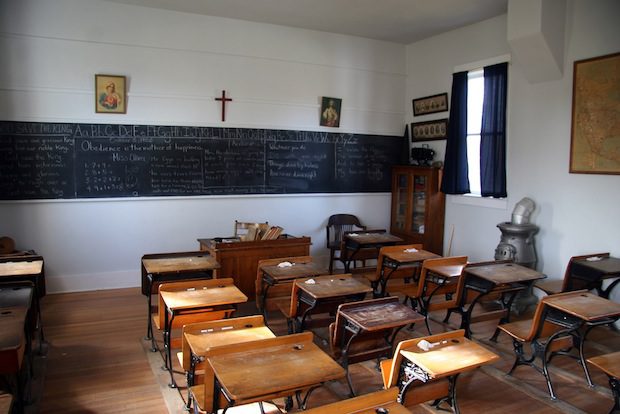Learning on Solid Ground

We live in an age of artifice, where everything has a price, and so we seek out irony and see sincerity as something quaint, maybe even for suckers—nice in its own way, but cheap and useless, like a solitary wildflower. Things that are good for their own sake, beautiful in themselves, like the truth, or wildflowers, don’t fit the frameworks built up around us. We are not a society that confused knowledge and credentials so much as one that chose the latter over the former, because it offers status more assuredly, and so one knows what one is paying for.
The consumption element of education has likely always been the hardest tension to hold for the individuals involved. You are, generally speaking, paying someone to teach you. Both of you have a product and a price in mind. The high political perspective worries about what you are being taught, how you are being formed as a citizen in a population, but the private, personal worry is whether you are being taught something worth it, worthy, at all. At the same time, the aspiration has traditionally been that what you are purchasing is priceless, that your teacher is unlocking chains you didn’t know you wore and opening a door you hadn’t known was right behind you. It’s a lot to expect, so a lot of people don’t.
Because of this tension within the idea of education, I hold my friend Joseph M. Keegin to be one of the most sincere men I know. No one else I have broken bread with wrestles with these questions with as much honesty or seriousness, and it is a matter he returns to again and again, first as a human being, but then as a writer, a teacher, and a bookseller. Focusing particularly on the problem of institutionalizing what we call education, working out of Ivan Illich’s writing, Joey has a new essay over at a site that’s new to me but made up of familiar faces, Breaking Ground. Read it, “Toward the Renewal of Humanistic Education in America.” In answer to the issue of ossifying institutions of credentialing and bureaucratized “learning,” he finds the life in community given in the confounding persistence of the one institution that truly is permanent, Christ’s church.
As Illich knew, Christianity is uniquely suited to address this problem of institutionality, and ultimately to reinvigorate humanistic education in America. Christ came into the world not to make us perfect political subjects, compliant employees, or maximally productive contributors to the economy, but to direct us toward holiness and to make us members of a community grounded in divine love, justice, and mercy rather than acquisitiveness and human caprice. Christianity inaugurates a way of being together that is at once individualistic and communitarian: in Christ we are knit into a community of believers, but we are also made responsible for what we say, think, and do. Christian community demands that we be our brother’s keeper, that our concern always be directed toward helping liberate others from the various tethers of this world in order to take on freely the easy yoke of our Lord’s justice and mercy. A Christian approach to education cannot ever take as its chief goal subsuming the student more seamlessly into a political or economic system, helping her maximize her earning potential, or training her to be a more effective political actor. The guidance of the soul toward the good is the only aim; everything else is incidental.